How to Keep Rabbits Out of Yard and Garden: Fences, Deterrents, Repellents and More

They may look like cute, cuddly animals, but there are plenty of reasons to keep rabbits out of your garden or yard. Rabbits love to nibble on tender shoots, leafy greens, vegetables, flowers, and shrubs. Preventing rabbits in your yard or garden requires a multi-method approach. It’s vital to protect your garden from plant-destroying bunnies with fences, growing plants rabbits hate and using a range of deterrents.
Rabbits are small, long-eared furry mammals in the family Leporidae. There are 13 species of wild rabbits, and nine are native to North America. The rabbit species that is the most significant pest is the eastern cottontail (Sylvilagus floridanus). This is the species probably responsible for devouring your garden plants and flowers.
This article is a guide to keeping rabbits out of gardens. You will find humane ways of protecting your vegetables, flowers, and fruits from the destruction rabbits can do to vegetation.
The Best Ways to Get Rid of Rabbits
A multi-targeted approach is the best way to rid your garden or yard of rabbits. Protect the garden perimeter and ornamental plants with chicken mesh embedded in the ground. Other ways to discourage wild bunnies include growing rabbit-resistant plants, using natural deterrents, and applying natural rabbit repellents to plants.
Usually, no one method is solely effective in ridding your property from rabbits. Please read on to discover all the various ways to keep rabbits out of your garden.
How to Identify Rabbits
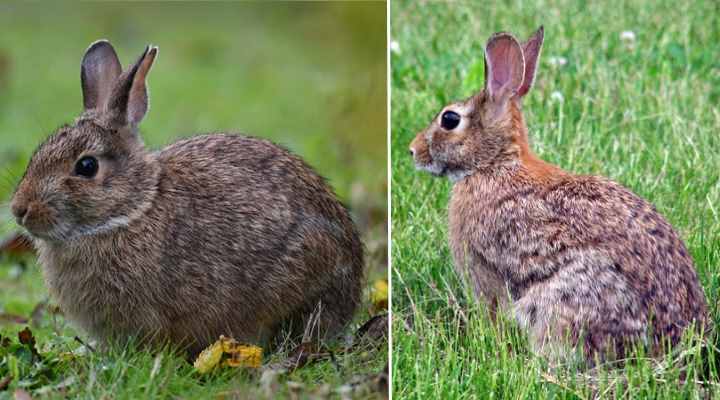
The eastern cottontail is the most common rabbit species in North America
Common garden rabbits such as the eastern cottontail are gray or brown, have long hind legs, big ears, and a short tail. Pesky cottontail bunnies tend to live under bushes, hedgerows, or in shallow holes. Unlike many rabbit species, eastern cottontails don’t live in burrows.
You’ll usually see rabbits active at dusk and dawn. This is when you can spot rabbits doing the most damage to your clovers, tulips, lettuce, carrot tops, and other leafy greens in your vegetable patch or flower bed.
Signs you may have rabbits in your yard include their pellet-like droppings, large holes under shrubs or hedges, and damaged plant foliage—especially on young, tender shoots.
Why Keep Rabbits Out of Yards and Gardens
Rabbits are such a nuisance in yards and gardens for several reasons. First, they reproduce rapidly. So, if you don’t get rid of rabbits quickly from your yard, they can soon take over. Second, rabbits constantly nibble on vegetation. You’ll usually notice rabbits munching non-stop on all sorts of plant matter.
What Are the Plants that Rabbits Eat?
Garden wild rabbits are pests that eat almost anything. Rabbits prefer to eat young tender shoots, which make their feeding habits so frustrating. Rabbits eat flowering plants, vegetables, and young shrubs that sometimes don’t get a chance to grow before they’ve become a tasty salad for your unwanted hopping pests.
Rabbits feed on a wide range of ornamental plants. Rabbits prefer to eat decorative flowers such as petunias, pansies, zinnias, daisies, impatiens flowers, coneflowers, and clematis. Rabbits can also eat plants such as roses, asters, sweet peas, and black-eyed Susans.
A rabbit’s diet also consists of a host of garden plants. Favorite plants of wild bunnies are many shrubs and perennial bulbs, especially when young shoots sprout. You’ll find rabbits chewing barberries, hawthorns, lilac, and witch hazel. Unfortunately, perennial bulbs are not safe from a rabbit’s appetite. Try to protect tulips, crocuses, and irises—mainly because these plants start growing in late winter or early spring when food for rabbits is scarce.
Rabbits also eat a wide range of vegetables such as lettuce, broccoli, peas, spinach, Swiss chard, and beets. Rabbits will also nibble away at young pear trees, apple trees, blueberry plants, and gooseberry bushes.
Rabbits love to eat tomato plants and they can destroy young tomato leaves growing on a vine. However, rabbits won’t eat through a whole tomato plant as the leaves are toxic in large amounts. If something is nibbling away at your tomato plant, check for signs of hornworms.
Unlike the cute pictures of rabbits, carrots are not a favorite vegetable of rabbits—although you will probably find them chewing tender carrot tops.
Rabbit-Resistant Plants
Help keep rabbits out of your garden by growing plants that rabbits don’t like. Rabbits are on the lookout constantly for morsels of tasty plants. If you grow rabbit-resistant plants, you’ll help stop attracting so many of the furry pests to your garden.
Generally, rabbits are put off by plants that are difficult to chew, taste bad, or cause injury. For example, plants that have thorns or jagged edges can help prevent rabbits. Also, strong-smelling flowers such as mint, yarrow, or lavender help to repel rabbits. Or you could pick garden plants that have leathery or fuzzy leaves.
Rabbit-resistant perennial plants include yarrow (Achillea), daylilies (Hemerocallis), salvia, torch lilies (Kniphofia uvaria), coreopsis, delphinium, and candytuft (Iberis sempervirens).
Rabbit-resistant ground cover plants to help keep rabbits out of gardens are vines, or creepers such as creeping myrtle (Vinca minor), catmint (Nepeta), lily of the valley (Convallaria majalis), wisteria, Virginia creeper (Parthenocissus quinquefolia), and ajuga (Ajuga reptans).
Rabbit-resistant shrubs you can plant in your yard to avoid attracting them are cotoneaster (Cotoneaster horizontalis), evergreen boxwood (Buxus), viburnum, juniper shrubs (Juniperus), holly bushes (Ilex), and lavender plants (Lavandula).
Rabbit-resistant bulbs that discourage rabbits are daffodils (Narcissus), alliums like garlic and onions, Spanish bluebells (Hyacinthoides hispanica), and netted iris (Iris reticulata).
Rabbit-resistant annuals that are suitable for deterring rabbits include pot marigold (Calendula), sweet alyssum (Lobularia maritima), geraniums (Pelargonium), and marigolds (Tagetes)
Rabbit Damage
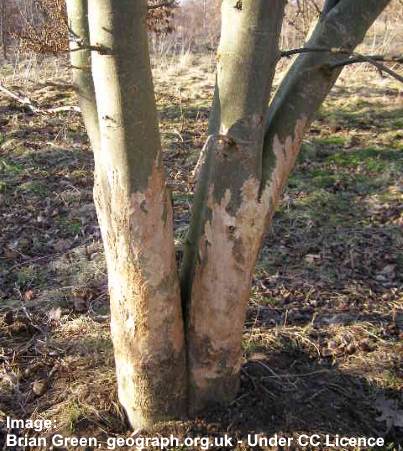
Tree damage caused by the gnawing teeth of rabbits
Rabbit damage in gardens and yards is easy to spot. To identify rabbit damage look for stems and leaves of plants that show cleanly cut damage near ground level. It’s best to check young shoots as these are the food of choice for rabbits. Rabbit plant damage is most devastating in early spring when plants start to grow.
To help keep rabbits out of your garden for good, it’s good to know that they can cause damage in any season.
Rabbit damage can be worse in spring because young plants may not recover. At other times of the year, rabbits cause harm to plants by munching on twigs, bark, the stems of woody shrubs, and young buds.
Other signs that rabbits are invading your garden and damaging plants include tufts of rabbit fur caught on twigs and branches, poop that looks like small black coffee beans, or tell-tale signs of rabbits’ paws on the soil around headless plants.
Rabbit Fence to Keep Rabbits Out of the Garden
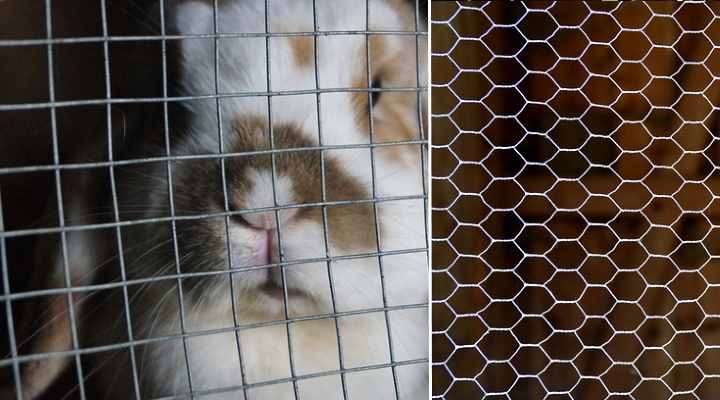
Rabbit or chicken fence can help keep rabbits out of your yard
The best way to keep rabbits out of your yard or garden is chicken wire fencing. You can also use fencing for rabbit prevention to protect certain areas of your garden. Installed correctly, chicken wire prevents rabbits from burrowing or hopping into gardens to nibble your plants.
To keep rabbits out of your garden and yard, install chicken wire mesh that is 2 to 3 ft. (0.6 – 1 m) high around the perimeter of your yard, vegetable patch, or flower bed. This prevents rabbits from being tempted to hop over. To prevent rabbits from burrowing, dig the mesh fence 6” (15 cm) into the ground.
A more robust way of keeping rabbits out of your garden is to install specially designed rabbit fencing. This rabbit protector is made from 16-gauge wire and is sturdier than thin chicken wire fencing.
Fences to keep your garden rabbit-proof are also an effective and cheap solution to protect vegetable patches from rabbit damage. You can construct a 2-foot (0.6-m) high wooden frame around your vegetables and securely attach chicken wire to it. Alternatively, you can create row covers to stop bunnies from eating leafy greens.
If you already have a wall or fence around your garden or yard, rabbit-proof it by inspecting for holes or openings at ground level. Rabbits can squeeze through holes as small as 3” (7.5 cm) in diameter. Use chicken wire mesh to cover holes or embed it 6” (15 cm) in the ground and attach it to your fence to keep rabbits out of your garden.
How to Get Rid of Rabbits
Despite your best efforts at keeping rabbits out of your yard, the pesky, furry animals might still find a way through. If you notice that rabbits are feeding on plants, it’s time to act. Here are some ways to get rid of rabbits from your garden.
Rabbits use their acute sense of smell to find tasty ornamental flowers, leafy vegetables, or other plants to eat. You could plant decorative onions (alliums) in your garden, as rabbits don’t like pungent aromas.
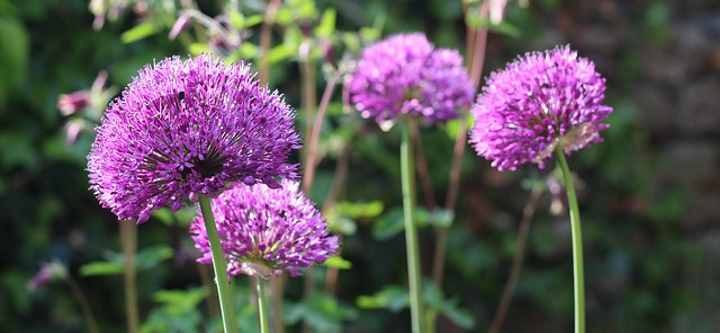
The smell of ornamental alliums is a natural rabbit repellent
Another way to keep rabbits out of your garden is to sprinkle cayenne pepper or chili powder on plants that rabbits are targeting. The spicy powder should be enough to repel rabbits, causing them to hop away quickly.
Some gardeners suggest sprinkling talcum powder on plants to deter rabbits from eating them. There is no evidence that it’s highly effective. Still, if rabbits are a nuisance, you could try talc on foliage near ground level as part of your pest management system.
Put shavings of Irish Spring soap in old nylon pantyhose and hang around your garden as a natural rabbit repellent. The strong-smelling aromas are said to make rabbits scurry away from plants and look elsewhere for food.
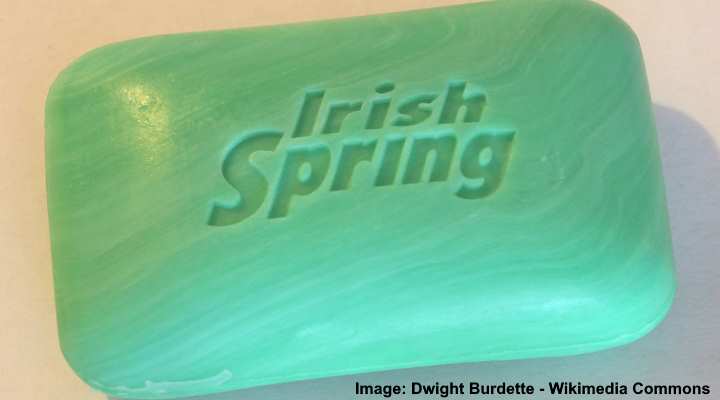
The strong smell of Irish Spring soap helps to repel rabbits
Some natural techniques to prevent deer may also work effectively against cottontail bunnies. Natural deer repellents that contain dried bovine blood, garlic, and sulfured eggs may also keep rabbits away. The sulfuric smell will make rabbits think that there is nothing tasty worth nibbling on.
It is said that human hair or pet hair helps to keep rabbits out of your garden. Rabbits are naturally timid creatures and scurry away at the first sign of danger. Spread human hair around your prized ornamental plants or vegetables to discourage them from eating these plants. If you brush your pet dog or cat, animal hair may be just as effective in keeping rabbits out of your yard.
How to Repel Rabbits (Including Natural Rabbit Repellent)
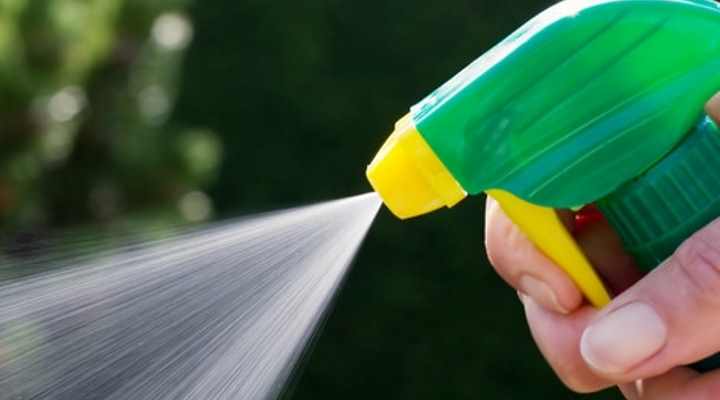
You can make your own natural rabbit repellent
Natural rabbit repellents can be effective as part of your integrated rabbit pest management system. Making your garden plants as unappealing as possible can help keep rabbits out of your garden. Repellents for rabbits generally have a pungent odor that rabbits hate.
There are many commercially available rabbit repellent products for sale. These generally work on the principle of deterring rabbits by irritating their sense of smell. However, it’s cheaper to make your own natural rabbit repellent.
Natural Rabbit Repellent
To make a natural repellent for rabbits, you’ll need a large sealable container. The ingredients for the homemade natural rabbit repellent are water, five garlic cloves, a teaspoon of crushed hot chili peppers, and one tablespoon of dish soap. Fill the jar with one gallon (3.7 l) of water, add all the ingredients, and shake well. Leave the ingredients in the sun for two days to infuse.
To use the natural rabbit repellent on plants, strain the solution through muslin or cheesecloth into a spray bottle. Liberally spray plants that you want to protect with the spicy, garlicky rabbit repellent liquid. Repeat once a week or after each rainfall to discourage rabbits from munching on your plants and keep rabbits away.
How to Keep Rabbits Out of the Garden Without a Fence
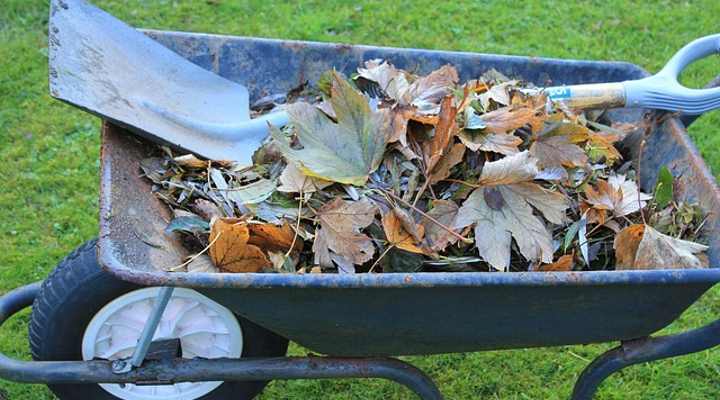
Clear away garden debris to deter rabbits
In some cases, it’s possible to keep rabbits out of a yard or garden without a fence. Sometimes, it’s impractical to erect a fence around a front or backyard. However, not having a fence makes rabbit prevention more challenging.
Here are a few ways to keep rabbits out of the garden without a fence:
- It’s vital to eliminate all places where rabbits can shelter
- Trim low-hanging branches
- Clear away debris or piles of dead foliage to make your garden less attractive to rabbits
- Seal spaces around deck areas and house foundations where rabbits can shelter
- Keep your garden free of weeds to help keep rabbits away
To protect your garden from rabbits without erecting barriers, you could use a combination of deterrent methods. The combination of rabbit deterrent methods includes spraying plants with a spicy solution, eliminating rabbit-friendly plants, growing rabbit-resistant plants, and scattering hair clippings around your plants.
Other Ways to Keep Rabbits Out of the Yard
It’s frustrating to notice signs of rabbit damage in yards—chewed foliage, droppings, and dug-up plants. What else can you try if rabbits have become a significant irritation and are destroying your garden?
Here are a few ideas that may help to stop rabbits from eating plants:
Buy electronic rabbit deterrents to keep them out of the yard. These emit an ultrasonic sound that is said to be irritating to rabbits. The idea is that whenever rabbits approach, the high-frequency sounds drive invasive rabbits away. These may work for a time, but rabbits often become immune to the sounds.
Use rabbit scare tactics. You could try a combination of devices that scare timid rabbits away. For example, scatter rubber snakes around your garden or hang a fake owl—both natural rabbit predators. Unfortunately, rabbits may get used to them and start to ignore them, but they could be an effective short-term solution.
Also, you could install wind chimes or have shiny moving objects to scare rabbits from your yard.
Get a pet to keep rabbits away. “Man’s best friend” could be your best friend in keeping rabbits out of your garden. Dogs will usually chase anything that comes into their territory. In time, wild rabbits should learn to avoid your yard.
Trap rabbits humanely. Trapping rabbits with humane traps can help keep their numbers down in your garden. However, it’s vital to know what you are doing. Trapped rabbits can become defensive. In most cases, it’s best to call professional pest control and know what local laws say about trapping animals on your property.
Related articles:
